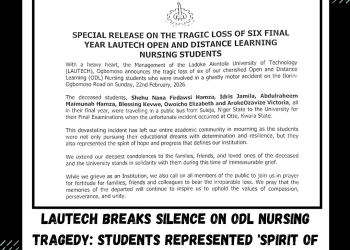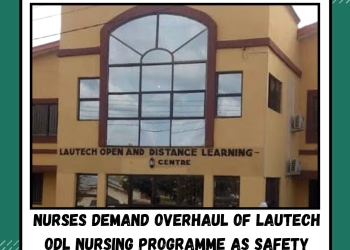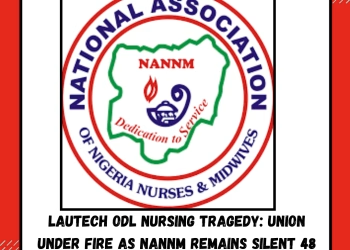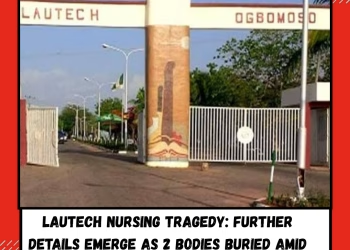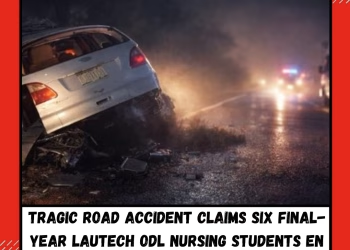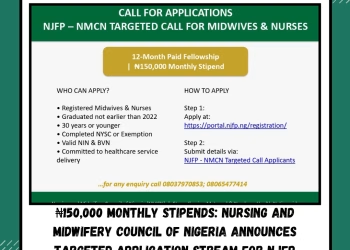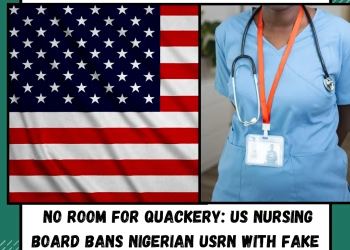Fellow Nurses Africa Publications, Lagos, Nigeria – 16 November 2025
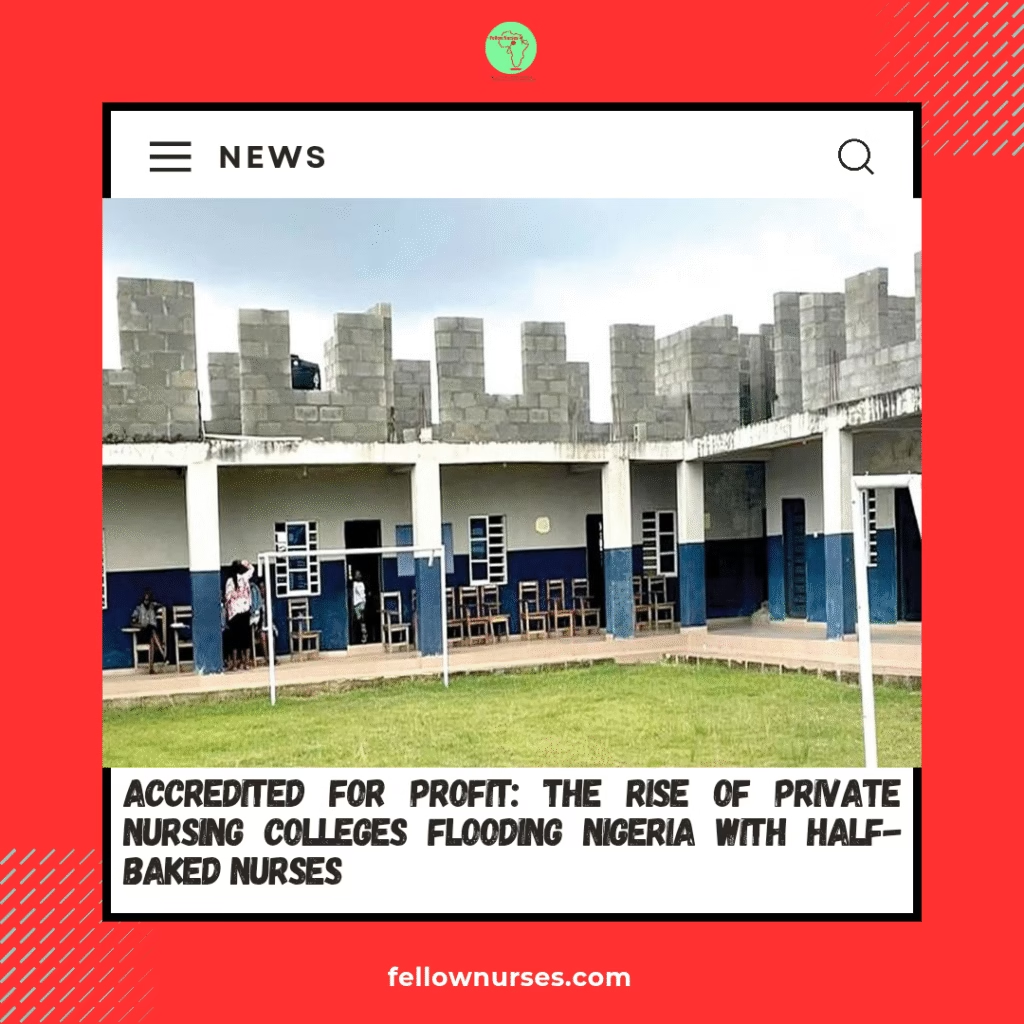
Accredited for Profit: The Rise of Private Nursing Colleges Flooding Nigeria with Half-Baked Nurses
In a dimly lit ward at a rural clinic in Delta State, a young mother bleeds heavily after childbirth. The nurse on duty—a fresh graduate from a private nursing college—freezes. She has never inserted an IV line under pressure, never managed postpartum haemorrhage. The clinic has no blood bank, no senior doctor. By the time help arrives from 40 kilometres away, the mother is gone. Her newborn survives, but the family is shattered. This is not a rare tragedy; it is becoming the grim norm in a healthcare system flooded with undertrained nurses from profit-driven private colleges.
Tower College of Health, Science and Management in Ikorodu, Lagos, sealed by authorities on 7 November for operating without full accreditation, is just one symptom of a deeper crisis. Nigeria has lost more than 42,000 nurses to emigration in the past three years, leaving hospitals desperate. The Nursing and Midwifery Council of Nigeria (NMCN) has responded by expanding accredited institutions from 290 in 2024 to 400 this year—private providers now driving the surge. But beneath the official approvals lies a terrifying reality: many of these colleges are churning out graduates who are not just unprepared—they are dangerous.
🔗 Join our Whatsapp channel here
A Ticking Time Bomb in Scrubs
The numbers are chilling. Nigeria’s nurse-to-patient ratio stands at one to 1,000—five times worse than the World Health Organization’s safe minimum. In some rural areas, it’s one nurse for 5,000. When these gaps are filled by graduates who have never handled a real emergency, the consequences are lethal.
- Maternal deaths: Nigeria already has one of the world’s highest maternal mortality rates—over 800 deaths per 100,000 live births. Undertrained nurses misjudge bleeding, delay oxytocin, or fail to recognise sepsis. A single mistake in a private clinic can end a life in minutes.
- Neonatal tragedies: Premature babies die from hypothermia because nurses don’t know how to use incubators that don’t exist in their training labs. Infections spread when sterile technique is never practised.
- Outbreak disasters: During the 2024 Lassa fever surge in Ebonyi State, private-college graduates working in isolation units breached protocols—removing gloves incorrectly, contaminating wards. One nurse’s error infected three colleagues; two died.
The November 2025 NMCN exams exposed the scale: a 9% pass rate in public health nursing. Graduates from private colleges dominated the failures. One examiner described answer sheets filled with “dangerous misconceptions”—students who believed malaria could be treated with paracetamol alone, or that hypertension was “not an emergency.”
Inside the Factories of Fear
Walk into a typical new private college and the terror begins. Classrooms built for 50 cram 200. One lecturer—often a junior nurse moonlighting for extra cash—teaches anatomy, pharmacology, and ethics in the same breath. Clinical rotation? A two-week visit to a crowded general hospital where students observe but never touch a patient.
Laboratories are a myth. Mannequins, if present, are cracked and missing limbs. IV fluid bags are reused for practice until they leak. One college in Imo State was found using expired saline sachets for injection drills. “We can’t afford new ones,” the proprietor shrugged—before charging each student ₦950,000 annually or even more.
Admission is a free-for-all. JAMB scores of 140 are accepted. Some colleges waive exams entirely: pay ₦50,000 “processing fee” and you’re in. The result? Students who struggle with basic biology are fast-tracked to handle life-or-death decisions.
Real Lives, Real Nightmares
In Ogun State last month, a private-college graduate misread a fetal monitor during labour. The baby’s heart rate plummeted; she dismissed it as “machine error.” The child was born with severe brain damage. The mother, a teacher, now cares for a son who will never walk or speak.
In Kano, a nurse from a 2023-accredited private school administered adult-dose insulin to a child with diabetic ketoacidosis. The boy slipped into a coma. His father, a tailor, sold his shop to pay for dialysis that came too late.
These are not anomalies. A confidential survey of 50 teaching hospitals found that 68% of adverse events involving nurses in 2025 were linked to graduates from private colleges established after 2021. Medication errors, wrong-site procedures, and failure to escalate critical cases topped the list.
The Global Fallout
The danger doesn’t stop at Nigeria’s borders. The 2023 UK fraud scandal—where 717 Nigerian nurses allegedly used proxies to pass competency tests—traced many of this to poor nursing foundation with no clinical oversight. Not only in the UK, some of these low quality nurses are also in the USA, Canada etc endlessly giving Nigeria bad reputation.
Back home, the fear is palpable. Patients in private clinics now demand to see certificates. “I ask for their index number,” says a Lagos trader recovering from surgery. “If it’s from one of those new schools, I discharge myself.”
A System on the Brink
The NMCN insists it is acting—closing Tower, Covenant, and Ajorosun colleges this year. But with only two institutions under formal embargo, the message is weak. Proprietors reopen under new names. Students, desperate for qualifications, keep enrolling.
Health Minister Dr Tunji Alausa warns of a “public health catastrophe” if standards slip further. Yet private colleges continue to advertise: “No JAMB! Start January! Guaranteed license!” The cycle feeds itself.
In the sealed gate of Tower College, a faded poster still reads: “Your future in nursing starts here.” For too many families across Nigeria, that future now ends in a morgue. The question is no longer whether the system is broken—but how many more must die before it is fixed.
🔗 Join our Whatsapp channel here
Fellow Nurses Africa is the independent voice of African nursing, we educate, inform and support nurses across Africa

